
Six Reasons We Have to Carry Our Crosses
Session Two
Read the slides below and then follow the information on the rest of the page.
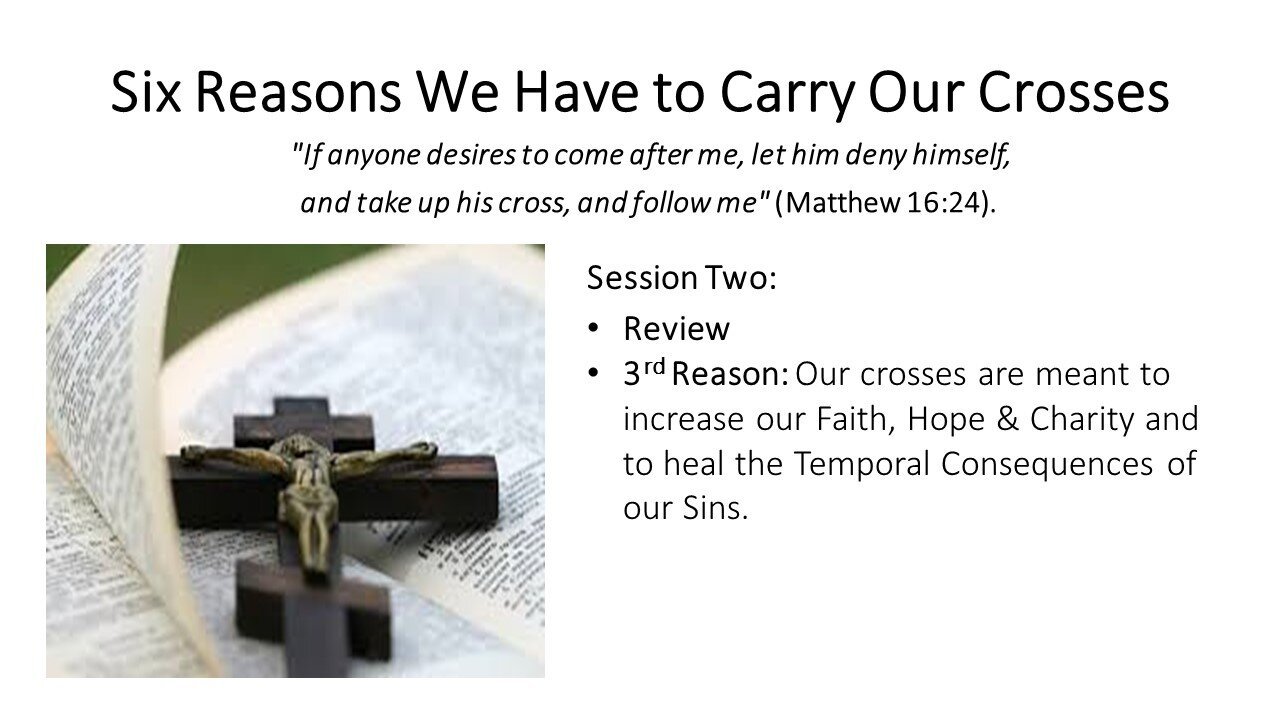
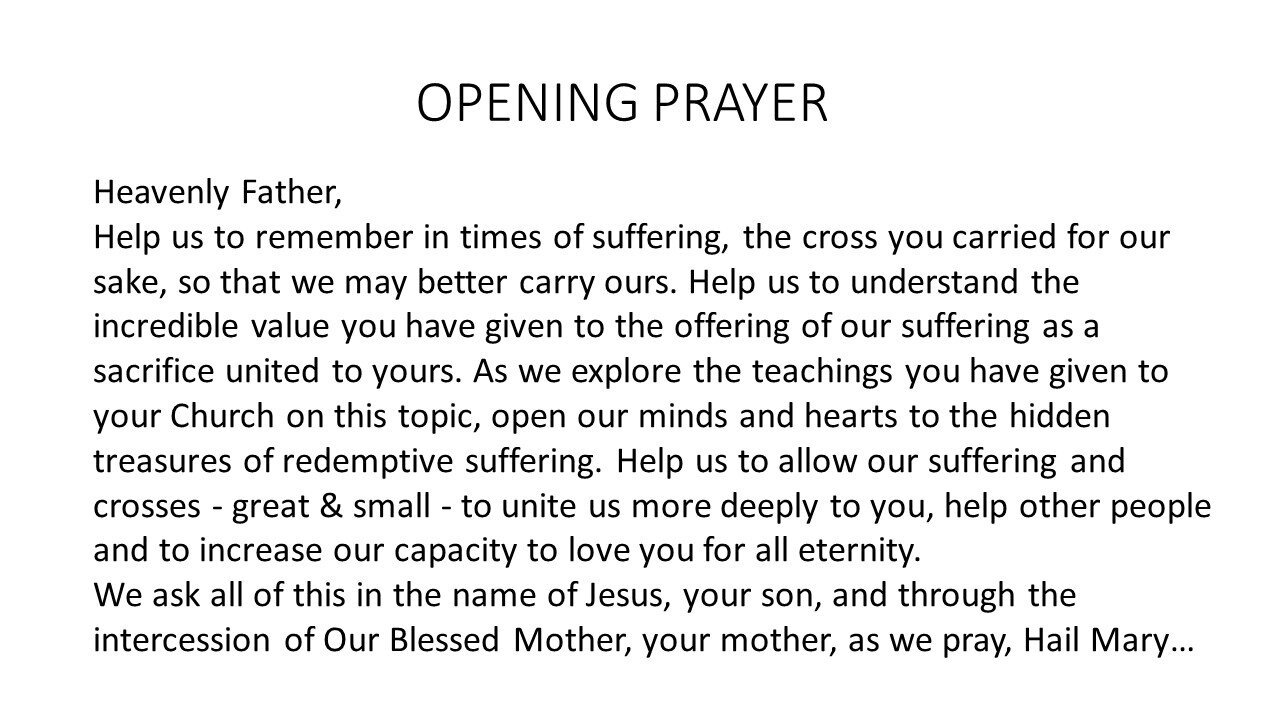

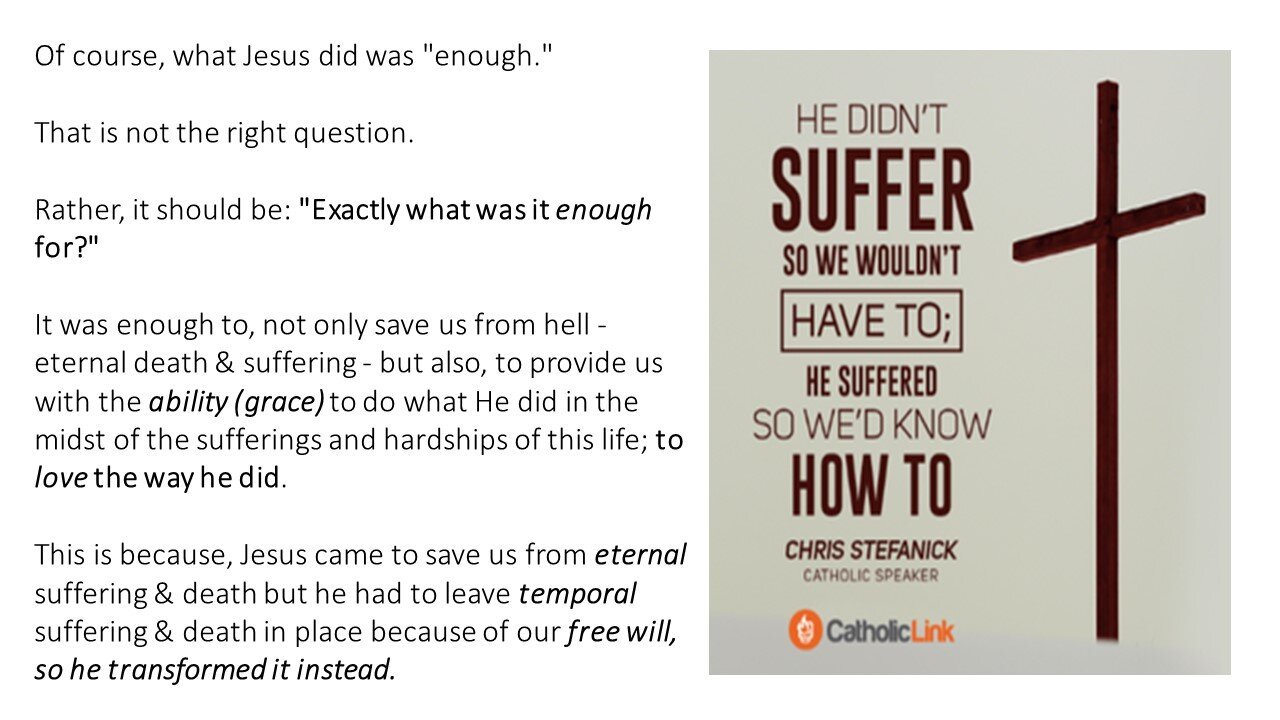




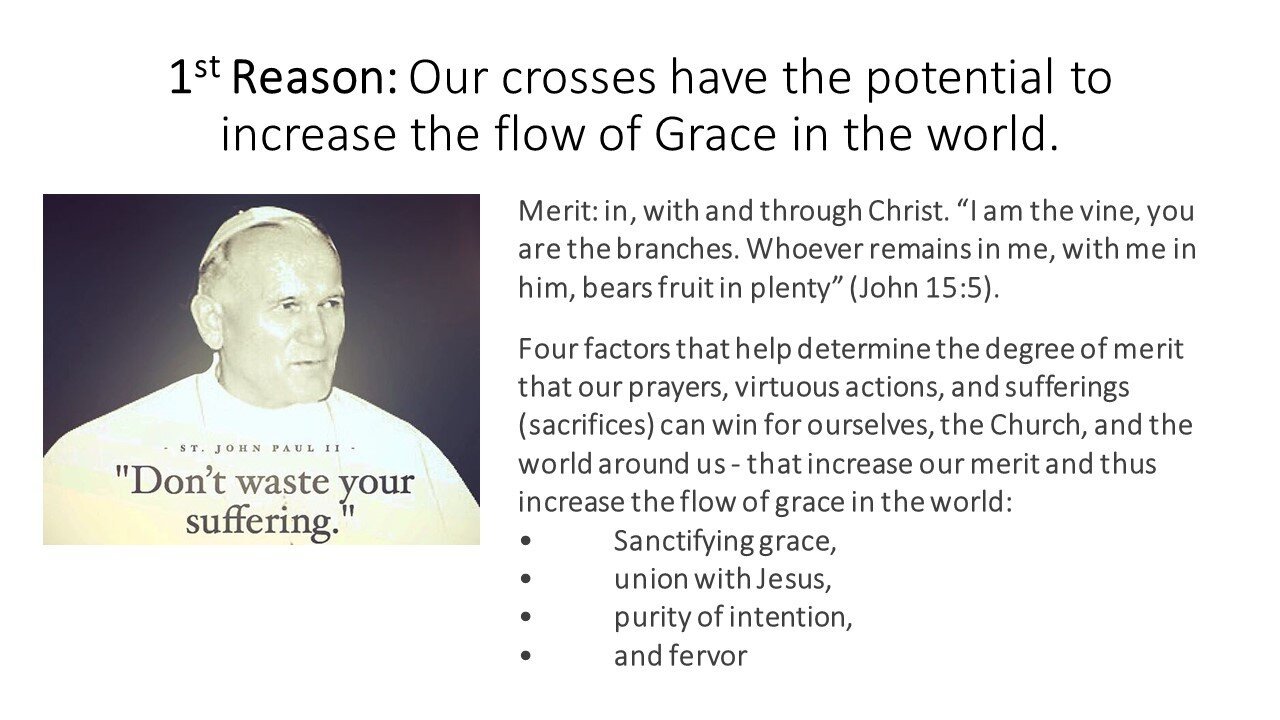
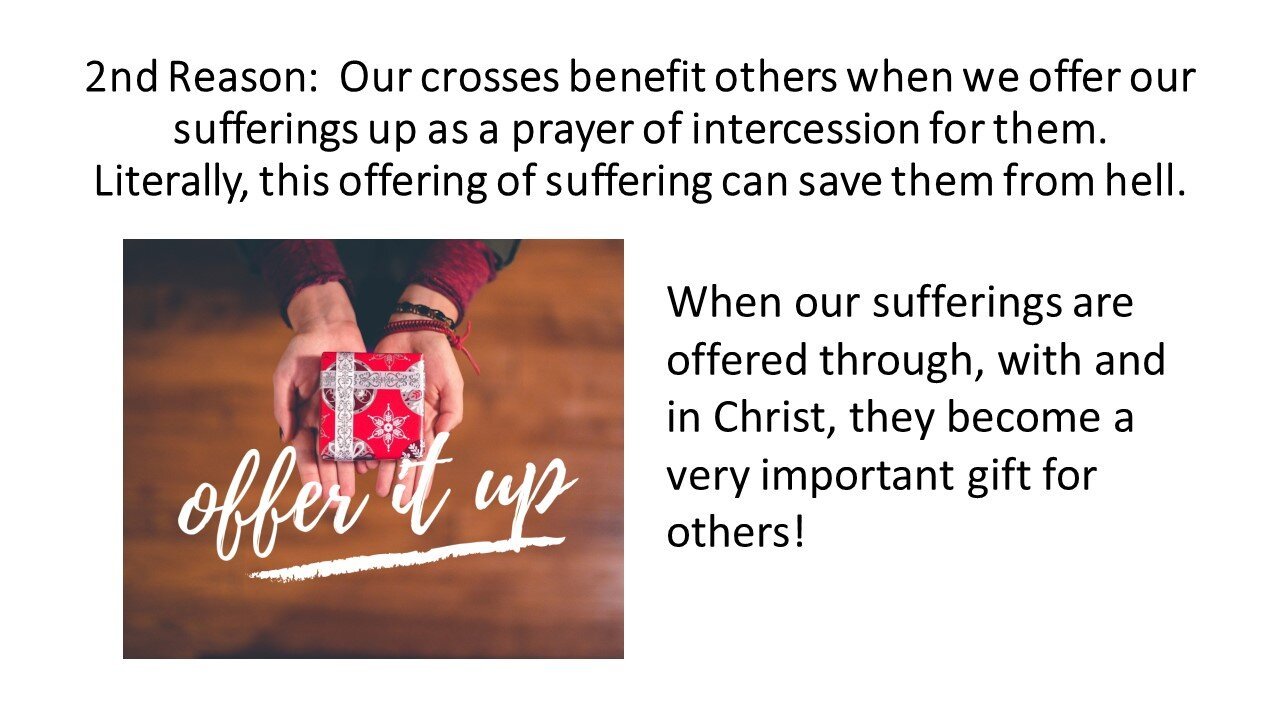
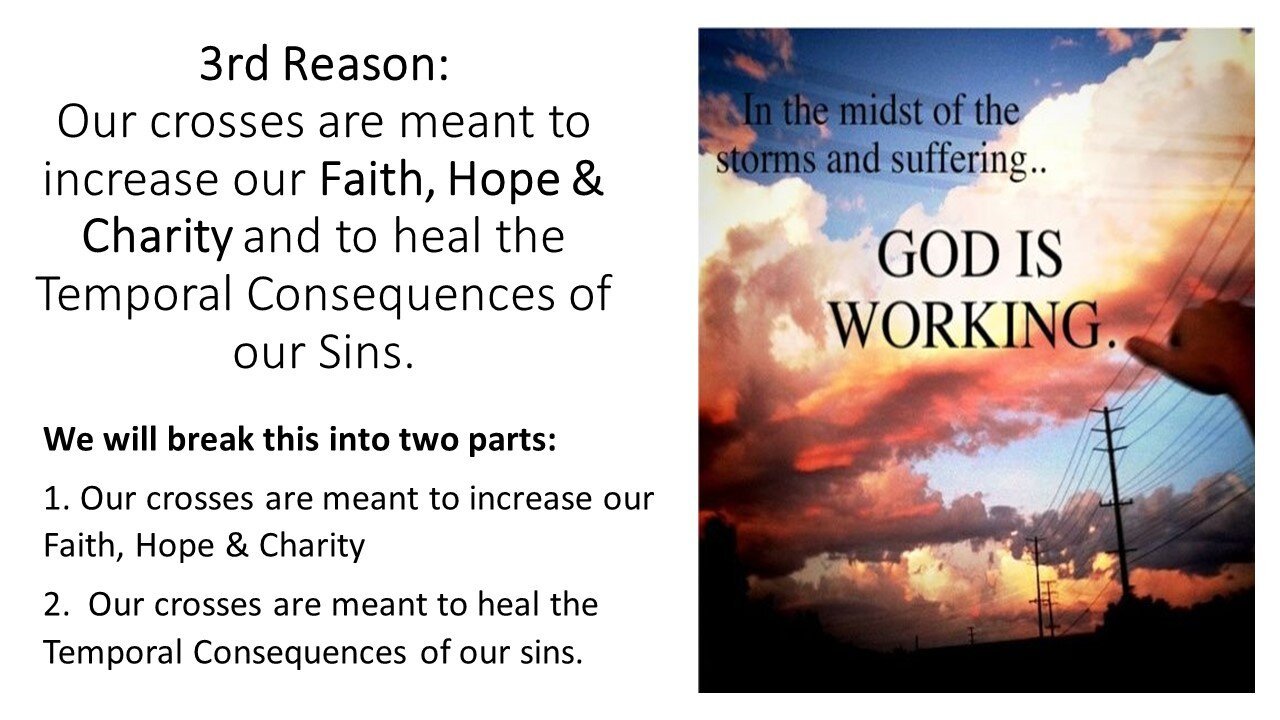
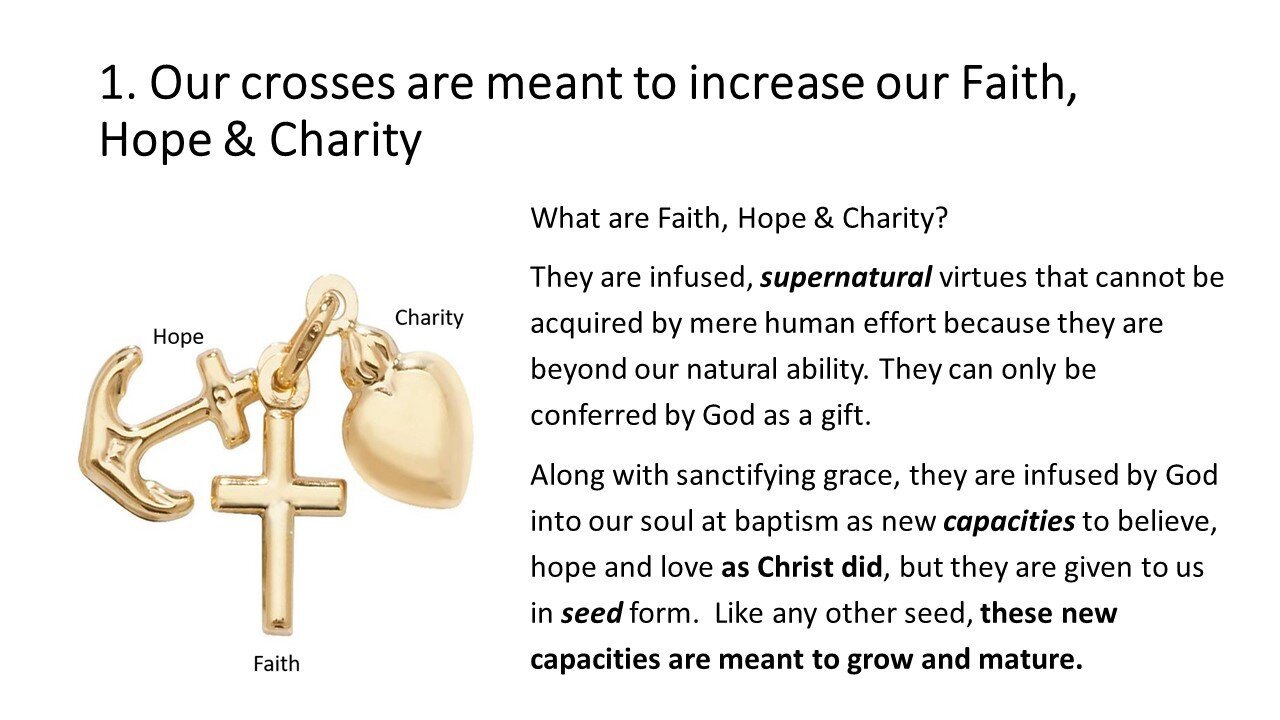





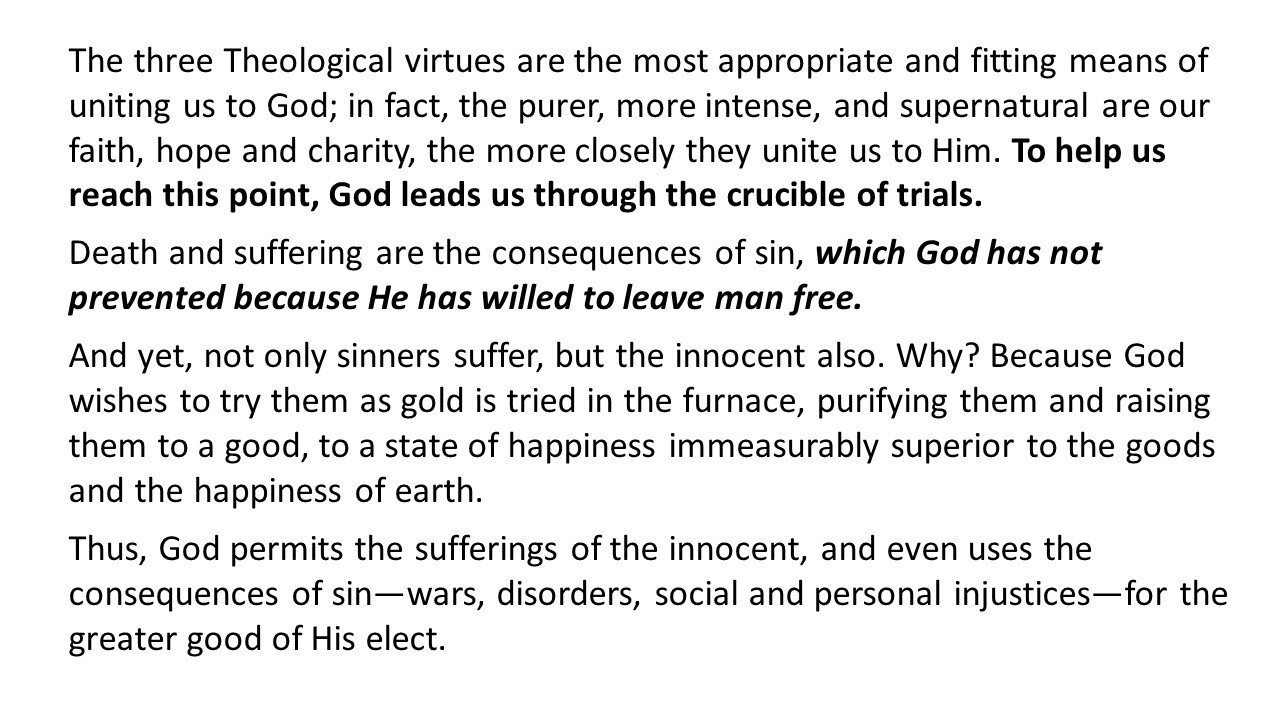

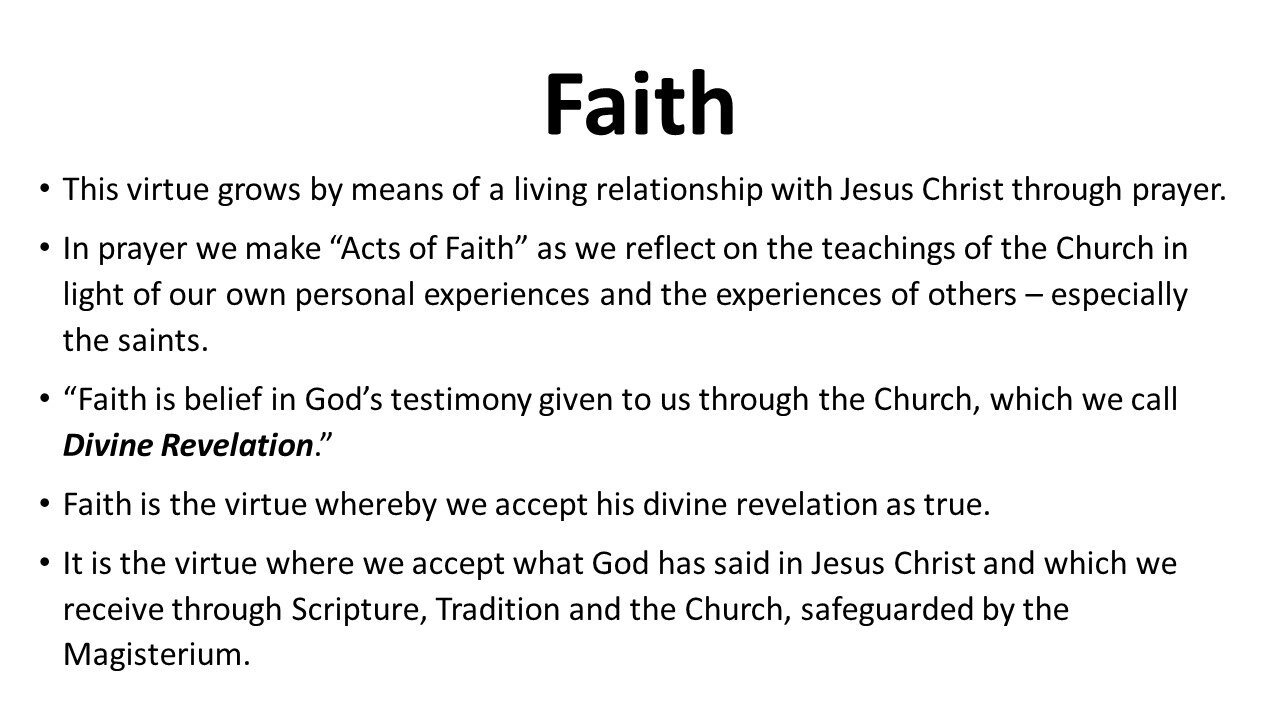
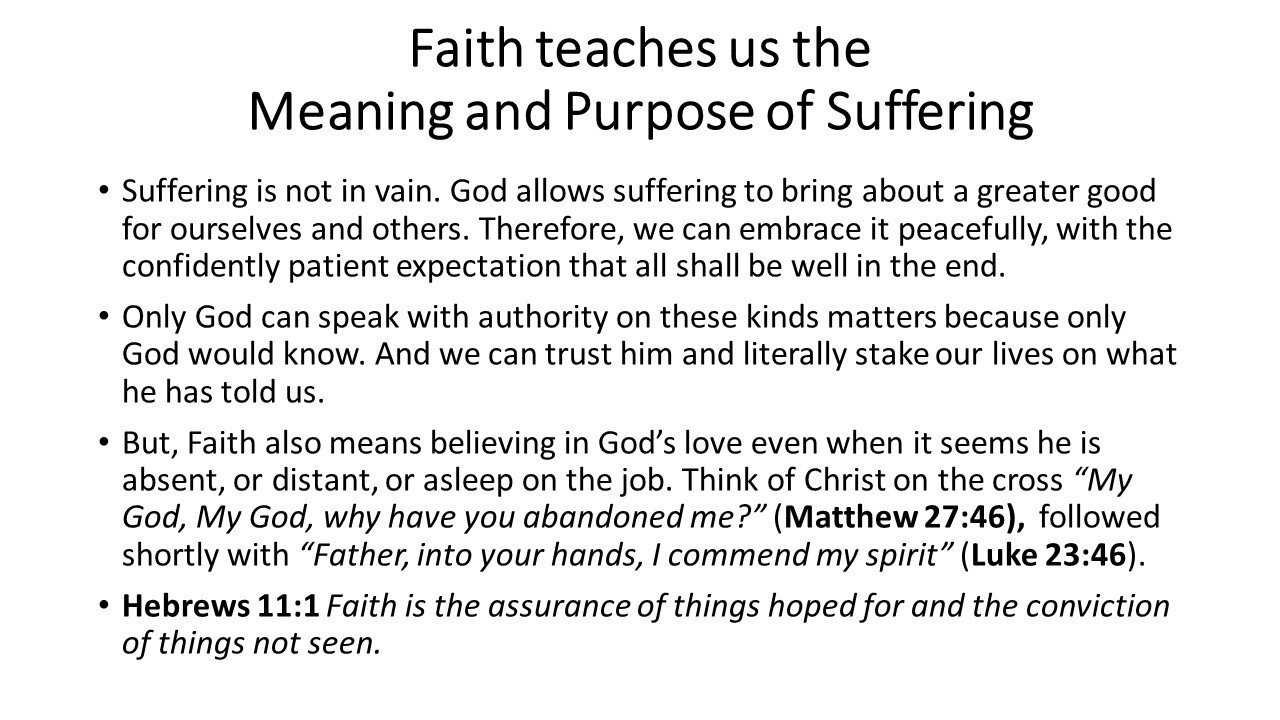

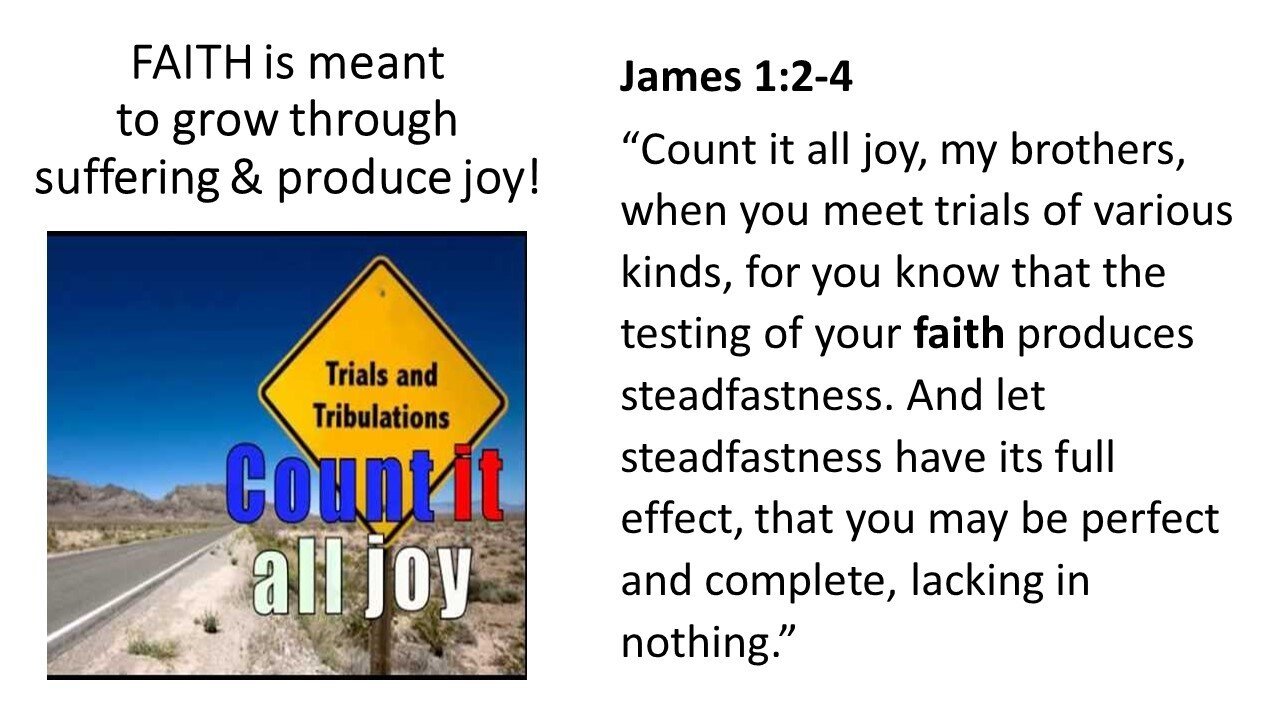
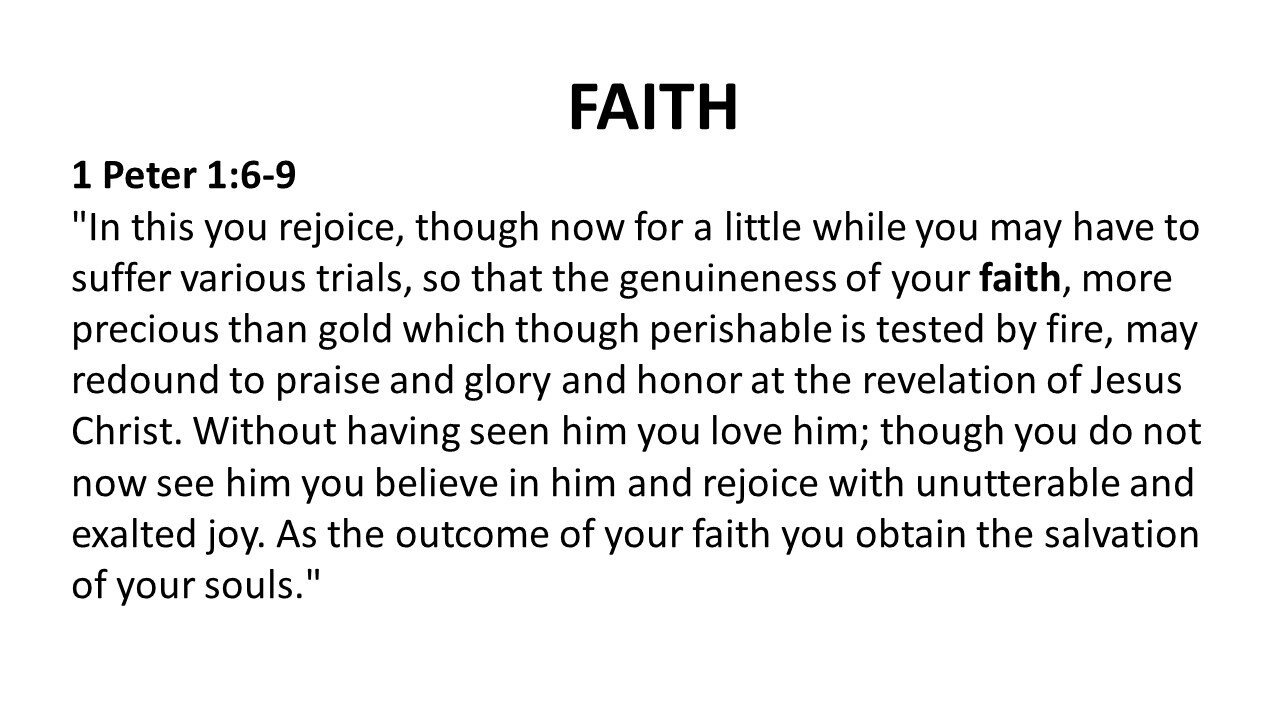






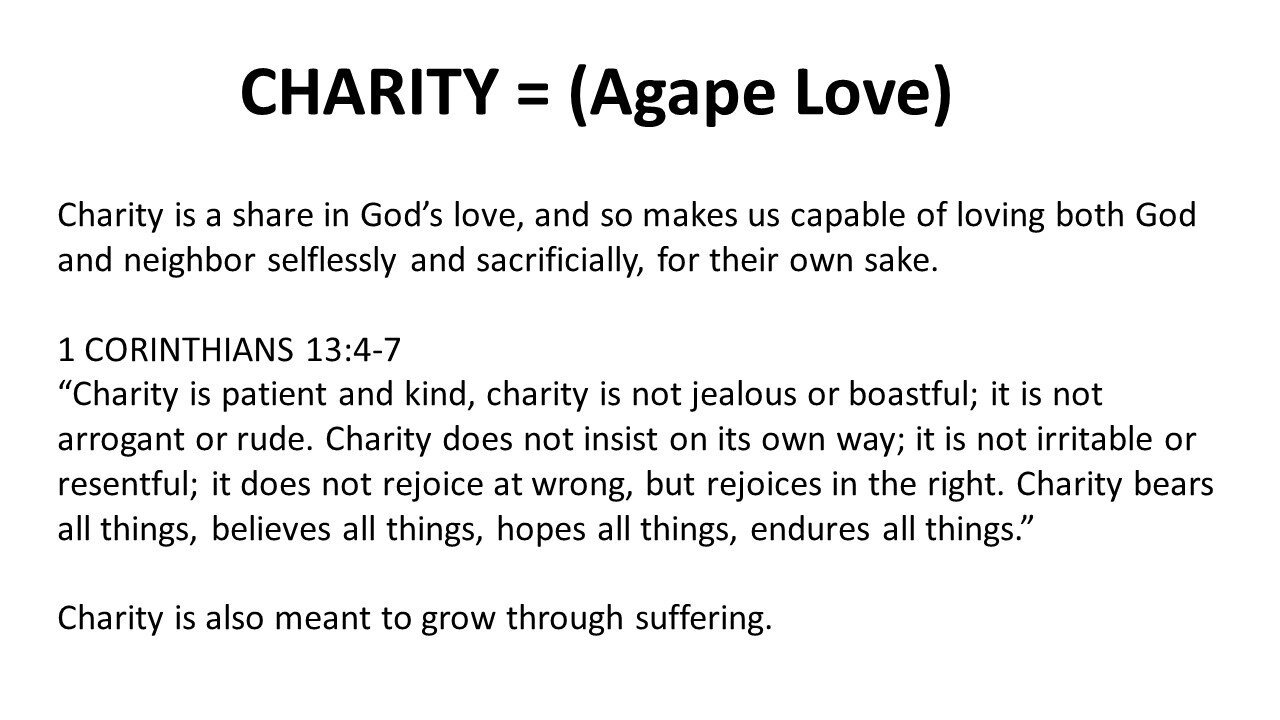






Press the black button below for class notes from this session:
You can listen to three of School of Faith’s Rosary Meditations on Faith, Hope & Love by pressing the three black buttons below:
Transcript for “Hope Fuels Determination” Rosary Meditation
ONE
In the 1994 movie, The Shawshank Redemption, the character Andy Dufresne arrives in prison as an innocent man, framed for crimes he didn’t commit. Once there, every action he takes—both large and small—seems odd, even for prison life. His actions, which catch the attention of other inmates, are informed by something hidden, something that unfolds in the plot: Hope. Andy is determined to escape his harsh and hellish imprisonment so has been secretly planning his escape through a series of intricate details, including the digging of a tunnel. He is entirely driven by his hope of escape and his determination to achieve it. Dufresne accomplishes his goal, and, along with his friend Red, escapes to a coastal village in Mexico. The resort town of Zihuantanejo symbolizes heaven, the place of beauty, tranquility, rest, and friendship, a place that captivates him, even though he’s never been there. He believes in it, though, and is convinced he is destined to get there. Thus, he overcomes every difficulty. Hope is an operative virtue, not theoretical. It gives us confidence that we will achieve what God wants of us in the end. Hope motivates, endures, and conquers all challenges. It is the virtue of success! Lord, may our hope in heaven fuel our determination not to make a home in this life, imprisoned as we are in sin, so that all of our actions and thoughts are fueled by a determination to reach our homeland eternally with you in heaven.
TWO
Hope is defined in the CCC as the virtue by which we desire and expect from God both eternal life and the grace we need to attain it (cf. # 1817). In his first letter, St. John tells us, “I write these things to you who believe in the name of the Son of God, that you may know that you have eternal life. And this is the confidence that we have toward him, that if we ask anything according to his will, he hears us (1 Jn 5:13-14). And we find in the book of Hebrews, “…faith is the assurance of things hoped for, the conviction of things not seen” (Heb 11:1). Our faith and hope work together to bring confidence that grace will bring us to our final end. Hope is the virtue which enables me to possess something I don’t yet own, like a house, but can enjoy as my own, because I have God’s promise. This determination for my destiny colors everything I choose and brings peace and patience during life’s tribulations. Jesus, you are my hope and my salvation. May I seek you every day in Holy Communion so that my hope motivates me to accept challenges, even attacks, to my faith so that I persevere to the end.
THREE
Patience is a virtue that works alongside hope. If I have confidence that heaven awaits me, that my works and desires, when charged by grace, have the new capacity to achieve this destination, I will discover my determination. Difficult surroundings become merely the lathe whereby the Holy Spirit hones, prunes, and sands my rough edges. I become more docile in His hands and cease resisting so much the trials of life. This is what inspired St. Paul to say, “For I am convinced that neither death nor life, neither angels nor demons, neither the present nor the future, nor any powers, neither height nor depth, nor anything else in all creation, will be able to separate us from the love of God that is in Christ Jesus our Lord.” (Rom 8: 38-39). This lathe of difficulty often hurts, but afterwards, what richness in our fruits; what maturity in our actions; what determination in our efforts. Let us remember these wise words, the road to heaven is itself heaven; the road to hell is itself hell. Let us strive for heaven today with hope and so accept and maybe enjoy every difficult step on our journey there.
FOUR
There are many vices that undermine hope. Indeed, this is why the 7 deadly sins are so deadly. There are two sins that we must be very careful to avoid because they undermine hope. The sins of presumption and despair are two sides of the same coin even though they seem opposed. Presumption assumes I don’t have to lift a finger or repent because God has no expectations of change for me, while despair means there is no possibility for me to change because God’s expectations are impossible. Why do they belong together? Because they both flow from selfish pride. In each case, the proud man believes either too much in his lack of effort so offers too little from himself, or believes too little in his efforts, despite the action of God working through them. When I rely too much on myself, I will fluctuate between these two false poles. When I place my hope in God, however, I will not be disappointed because His Mercy for me fulfills all promises. “For with the Lord there is steadfast love and the fullness of redemption. And He will redeem His people from all our iniquities” (Psalm 130:7-8).
FIVE
To escape through his tunnel, Andy Dufresne had to crawl and scurry through slime and muck, enduring all kinds of difficulty to get to his paradise. Hope fueled his determination and kept him from turning back. In our life, we, too, will have much to endure, even the slime and muck of sin. The Virtue of Hope, however, is the virtue that will strengthen our endurance by doing two things: keeping before our eyes the reality of what lies ahead, while simultaneously transforming the challenges from obstacles in our way to rungs on our ladder to climb. In this way, we will discover that hope brings victory. Let us close with this beautiful prayer to Our Lady of Hope: “O Blessed Virgin Mary, Mother of Grace, Hope of the world, hear us, your children, who cry to you; let us pray O God, who by the marvelous protection of the Blessed Virgin Mary has strengthened us firmly in Hope, grant that by persevering in prayer at her request, we may endure all things and obtain life everlasting, through Christ our Lord, Amen.
Press the black button below to read a meditation on the Virtue of Hope:
The Refiner’s Fire
There was a group of women in a Bible Study on the book of Malachi. As they were studying chapter three, they came across verse three, which says: "He will sit as a refiner and purifier of silver. "This verse puzzled the women and they wondered what this statement meant about the character and nature of God.
One of the women offered to find out the process of refining silver and get back to the group at their next Bible Study. That week, this woman called up a silversmith and made an appointment to watch him at work.
She didn't mention anything about the reason for her interest beyond her curiosity about the process of refining silver. As she watched the silversmith, he held a piece of silver over the fire and let it heat up. He explained that in refining silver, one needed to hold the silver in the middle of the fire where the flames were hottest as to burn away all the impurities.
The woman thought about God holding us in such a hot spot then she thought again about the verse, that "He sits as a refiner and purifier of silver." She asked the silversmith if it was true that he had to sit there in front of the fire the whole time the silver was being refined. The man answered that yes, he not only had to sit there holding the silver, but he had to keep his eyes on the silver the entire time it was in the fire. If the silver was left a moment too long in the flames, it would be destroyed.
The woman was silent for a moment. Then she asked the silversmith, how do you know when the silver is fully refined? He smiled at her and answered, "Oh, that's easy - when I see my image in it."
Press the button below for the blog post that we read together on Temporal Punishment for our sins:
2 Corinthians 12:7-10
“And to keep me from being too elated by the abundance of revelations, a thorn was given me in the flesh, a messenger of Satan, to harass me, to keep me from being too elated. Three times I besought the Lord about this, that it should leave me; but he said to me, ‘My grace is sufficient for you, for my power is made perfect in weakness.’…For the sake of Christ, then, I am content with weaknesses, insults, hardships, persecutions, and calamities; for when I am weak then I am strong.”
2 Corinthians 4:16-18
“So we do not lose heart. Though our outer nature is wasting away, our inner nature is being renewed every day. For this slight momentary affliction is preparing for us an eternal weight of glory beyond all comparison, because we look not to the things that are seen but to the things that are unseen; for the things that are seen are transient, but the things that are unseen are eternal.”
1 Peter 4:12-19
“Beloved, do not be surprised at the fiery ordeal which comes upon you to prove you, as though something strange were happening to you. But rejoice in so far as you share Christ’s sufferings, that you may also rejoice and be glad when his glory is revealed. If you are reproached for the name of Christ, you are blessed, because the spirit of glory and of God rests upon you. But let none of you suffer as a murderer, or a thief, or a wrongdoer, or a mischief-maker; yet if one suffers as a Christian, let him not be ashamed, but under that name let him glorify God. For the time has come for judgment to begin with the household of God; and if it begins with us, what will be the end of those who do not obey the gospel of God? And “If the righteous man is scarcely saved, where will the impious and sinner appear?” Therefore let those who suffer according to God’s will do right and entrust their souls to a faithful Creator.”
Romans 8:16-18
It is the Spirit himself bearing witness with our spirit that we are children of God, and if children, then heirs, heirs of God and fellow heirs with Christ, provided we suffer with him in order that we may also be glorified with him. I consider that the sufferings of this present time are not worth comparing with the glory that is to be revealed to us.
John 15:1-5
“I am the true vine, and my Father is the vinedresser. Every branch of mine that bears no fruit, he takes away, and every branch that does bear fruit he prunes, that it may bear more fruit. You are already made clean by the word which I have spoken to you. Abide in me, and I in you. As the branch cannot bear fruit by itself, unless it abides in the vine, neither can you, unless you abide in me. I am the vine, you are the branches. He who abides in me, and I in him, he it is that bears much fruit, for apart from me you can do nothing.”
1393 Holy Communion separates us from sin. The body of Christ we receive in Holy Communion is "given up for us," and the blood we drink "shed for the many for the forgiveness of sins." For this reason the Eucharist cannot unite us to Christ without at the same time cleansing us from past sins and preserving us from future sins:
For as often as we eat this bread and drink the cup, we proclaim the death of the Lord. If we proclaim the Lord's death, we proclaim the forgiveness of sins. If, as often as his blood is poured out, it is poured for the forgiveness of sins, I should always receive it, so that it may always forgive my sins. Because I always sin, I should always have a remedy. 230
1394 As bodily nourishment restores lost strength, so the Eucharist strengthens our charity, which tends to be weakened in daily life; and this living charity wipes away venial sins. 231 By giving himself to us Christ revives our love and enables us to break our disordered attachments to creatures and root ourselves in him:
Since Christ died for us out of love, when we celebrate the memorial of his death at the moment of sacrifice we ask that love may be granted to us by the coming of the Holy Spirit. We humbly pray that in the strength of this love by which Christ willed to die for us, we, by receiving the gift of the Holy Spirit, may be able to consider the world as crucified for us, and to be ourselves as crucified to the world.... Having received the gift of love, let us die to sin and live for God. 232
1395 By the same charity that it enkindles in us, the Eucharist preserves us from future mortal sins. The more we share the life of Christ and progress in his friendship, the more difficult it is to break away from him by mortal sin. The Eucharist is not ordered to the forgiveness of mortal sins - that is proper to the sacrament of Reconciliation. The Eucharist is properly the sacrament of those who are in full communion with the Church.
1396 The unity of the Mystical Body: the Eucharist makes the Church. Those who receive the Eucharist are united more closely to Christ. Through it Christ unites them to all the faithful in one body - the Church. Communion renews, strengthens, and deepens this incorporation into the Church, already achieved by Baptism. In Baptism we have been called to form but one body. 233 The Eucharist fulfills this call: "The cup of blessing which we bless, is it not a participation in the blood of Christ? The bread which we break, is it not a participation in the body of Christ? Because there is one bread, we who are many are one body, for we all partake of the one bread:" 234
If you are the body and members of Christ, then it is your sacrament that is placed on the table of the Lord; it is your sacrament that you receive. To that which you are you respond "Amen" ("yes, it is true!") and by responding to it you assent to it. For you hear the words, "the Body of Christ" and respond "Amen." Be then a member of the Body of Christ that your Amen may be true. 235
1397 The Eucharist commits us to the poor. To receive in truth the Body and Blood of Christ given up for us, we must recognize Christ in the poorest, his brethren:
You have tasted the Blood of the Lord, yet you do not recognize your brother,. . . . You dishonor this table when you do not judge worthy of sharing your food someone judged worthy to take part in this meal. . . . God freed you from all your sins and invited you here, but you have not become more merciful. 236
1398 The Eucharist and the unity of Christians. Before the greatness of this mystery St. Augustine exclaims, "O sacrament of devotion! O sign of unity! O bond of charity!" 237 The more painful the experience of the divisions in the Church which break the common participation in the table of the Lord, the more urgent are our prayers to the Lord that the time of complete unity among all who believe in him may return.
1399 The Eastern churches that are not in full communion with the Catholic Church celebrate the Eucharist with great love. "These Churches, although separated from us, yet possess true sacraments, above all - by apostolic succession - the priesthood and the Eucharist, whereby they are still joined to us in closest intimacy." A certain communion in sacris, and so in the Eucharist, "given suitable circumstances and the approval of Church authority, is not merely possible but is encouraged." 238
1400 Ecclesial communities derived from the Reformation and separated from the Catholic Church, "have not preserved the proper reality of the Eucharistic mystery in its fullness, especially because of the absence of the sacrament of Holy Orders." 239 It is for this reason that, for the Catholic Church, Eucharistic intercommunion with these communities is not possible. However these ecclesial communities, "when they commemorate the Lord's death and resurrection in the Holy Supper . . . profess that it signifies life in communion with Christ and await his coming in glory." 240
1401 When, in the Ordinary's judgment, a grave necessity arises, Catholic ministers may give the sacraments of Eucharist, Penance, and Anointing of the Sick to other Christians not in full communion with the Catholic Church, who ask for them of their own will, provided they give evidence of holding the Catholic faith regarding these sacraments and possess the required dispositions. 241
Notes:
226 Jn. 6:56.
227 Jn 6:57.
228 Fanqith, Syriac Office of Antioch, Vol. 1, Commun., 237 a-b.
229 PO 5.
230 St. Ambrose, De Sacr. 4, 6, 28: PL 16, 446; cf. I Cor 11:26.
231 Cf. Council of Trent (1551): DS 1638.
232 St. Fulgentius of Ruspe, Contra Fab. 28, 16-19: CCL 19A, 813-814.
233 Cf. I Cor 12:13.
234 I Cor 10:16-17.
235 St. Augustine, Sermo 272: PL 38, 1247.
236 St. John Chrysostom, Hom. in I Cor. 27, 4: PG 61, 229-230; cf. Mt 25:40.
237 St. Augustine, In Jo. ev. 26, 13: PL 35, 1613; cf. SC 47.
238 UR 15 § 2; cf. CIC, can. 844 § 3.
239 UR 22 § 3.
240 UR 22 § 3.
241 Cf. CIC, can. 844 § 4.
English Translation of the Catechism of the Catholic Church for the United States of America © 1997, United States Catholic Conference, Inc.
THE TEETER TOTTER
We are all born with the effects of Original Sin in our souls which leave their mark by a proclivity to sin. We can see that most clearly in our disordered desires. Some examples would be: desiring junk food, over-eating, over-sleeping, over-drinking, spending too much money on frivolous things, gossip, base humor, feelings of superiority, judging other people, need for attention and admiration, lust, etc. All of this is further compounded by our personal sins which lead to sinful habits.
As we cooperate with the grace we receive from the Mass and the sacraments - especially in the Sacrament of Reconciliation & in receiving the Sacred Heart of Jesus in Holy Communion (on a regular basis, in the state of grace, with an open heart, & a desire to offer ourselves completely in, with & through Christ to the Father for the salvation of the world) our disordered, worldly desires slowly but surely - gradually - change into God’s desires. Eventually, we don’t like sin anymore and we desire holiness and goodness. Eventually, our good desires become stronger than our disordered desires and it is our good desires that draw God’s grace into our souls more fully. But...even the graces from Holy Mass and the sacraments can’t be enacted without the regular (daily) practice of mental prayer. Mental prayer - Christian Meditation - prepares our hearts for a fruitful reception of Holy Communion and it allows the grace we receive in Holy Communion to work more efficiently - to change our desires and to empower us to act on our good desires. It actualizes the grace we have received. It stirs it up so to speak. (see methods of mental prayer here)
How does this happen? Spending time with God in prayer allows Him to work on our hearts & desires directly - in ways that are not detectable to our senses - but it also allows Him to work on our hearts and desires in ways that are detectable by showing us our disordered desires so that we can work on them together. In prayer God inspires us to make resolutions to practice the virtues that will change our hearts and our desires. As we go about our day, his grace helps us to complete the resolutions we have made and when we fail, it helps us to get back up and try again without giving into discouragement.
One thing we should keep in mind, however, is that we never completely lose our sinful desires while we exist on this side of death. But, we can make great strides in this battle, strides that exceed by far what the human will can accomplish on its own.
We can become heroically virtuous people due to the effects of grace, especially the grace that we receive from Holy Communion combined with mental prayer. Struggling to fight a sinful, disordered desire is very pleasing to God even if for the rest of our life we have to struggle with it - fighting manfully to overcome it. This struggle can be the very means for a deeper union with God as St. Paul taught us :
“Therefore, in order to keep me from becoming conceited, I was given a thorn in my flesh, a messenger of Satan, to torment me. Three times I pleaded with the Lord to take it away from me. But he said to me, ‘My grace is sufficient for you, for my power is made perfect in weakness.’ Therefore I will boast all the more gladly about my weaknesses, so that Christ’s power may rest on me” (2 Cor. 12: 7-9).
Catechism of the Catholic Church
The Fruits of Holy Communion
1391 Holy Communion augments our union with Christ. The principal fruit of receiving the Eucharist in Holy Communion is an intimate union with Christ Jesus. Indeed, the Lord said: "He who eats my flesh and drinks my blood abides in me, and I in him." 226 Life in Christ has its foundation in the Eucharistic banquet: "As the living Father sent me, and I live because of the Father, so he who eats me will live because of me." 227
On the feasts of the Lord, when the faithful receive the Body of the Son, they proclaim to one another the Good News that the first fruits of life have been given, as when the angel said to Mary Magdalene, "Christ is risen!" Now too are life and resurrection conferred on whoever receives Christ. 228
1392 What material food produces in our bodily life, Holy Communion wonderfully achieves in our spiritual life. Communion with the flesh of the risen Christ, a flesh "given life and giving life through the Holy Spirit," 229 preserves, increases, and renews the life of grace received at Baptism. This growth in Christian life needs the nourishment of Eucharistic Communion, the bread for our pilgrimage until the moment of death, when it will be given to us as viaticum.

